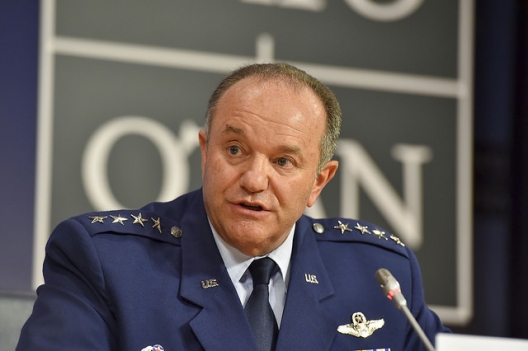 Excerpts from PBS interview with NATO Supreme Allied Commander Europe Gen. Philip Breedlove by Gwen Ifill, July 29, 2015.
Excerpts from PBS interview with NATO Supreme Allied Commander Europe Gen. Philip Breedlove by Gwen Ifill, July 29, 2015.
GWEN IFILL: I want to take you to Ukraine, especially Russia’s role. The new incoming nominee to be — for Joint Chiefs of Staff, Joe Dunford, said at a congressional hearing last week that he saw Russia as our chief global threat. Is that something you agree with?
GEN. PHILIP BREEDLOVE: I have testified to the same thing in the past.
GWEN IFILL: Why?
GEN. PHILIP BREEDLOVE: Well, clearly, there are lots of threats out there, for instance, ISIL.But I think what you hear from numerous leaders is that Russia is a different case. This is a nation that for 20 years we have tried to make a partner. And in the last few years, we have seen that they’re on a different path. So now we have a nation that has used force to change internationally recognized boundaries. Russia continues to occupy Crimea.Russian forces now are in the Donbass in Eastern Ukraine. So this nation has used force to change international boundaries. And this is a nation that possesses a pretty vast nuclear inventory, and talks about the use of that inventory very openly in the past. And so what I think you see being reflected is that we see a revanchist Russia that has taken a new path towards what the security arrangements in Europe are like and how they are employed.And they talk about using, as a matter of course, nuclear weapons. For that reason, these senior leaders, I believe, see that as a major threat.
GWEN IFILL: Secretary Kerry has not said that. And I wonder if the distinction there is between the diplomatic approach to dealing with Russia on things like Iran and the military concerns.
GEN. PHILIP BREEDLOVE: So, Russia can and we hope in the future will be a great partner. There are many places where our needs and requirements match. But, again, in Europe, they have established a pattern now, Georgia, Transnistria, Crimea, Donbass, where force is a matter of course. And that’s not what we look for in partners in Europe.
GWEN IFILL: So NATO has talked about providing training and artillery and some sort of support against this force you describe, this Russian bear on the border. Is that enough?
GEN. PHILIP BREEDLOVE: Well, NATO nations are offering some assistance to Ukraine, as is the United States. Many nations now are coming along to be a part of helping Ukraine to defend themselves. They have the right to defend themselves….
GWEN IFILL: Is there a line between preparation and provocation?
GEN. PHILIP BREEDLOVE: Absolutely. I believe there is. We do defensive measures, and in, I think, very easily defined defensive stances in our forward bases. We’re not putting big forces into the Baltics. Right now, there is a company of U.S. soldiers [NS: 100-200 soldiers] in each of the three Baltic states. That is well below a proportional issue….
GWEN IFILL: Well, give me an example of one way to get there, especially if the person who has to be your partner is Vladimir Putin, who doesn’t show any indication, other than being helpful at the Iran nuclear talks, of being the partner you envision.
GEN. PHILIP BREEDLOVE: So first, it’s communication. We need to reestablish those lines of communication. You have seen our secretary of state, undersecretary of state reaching out in several forums. Mil-to-mil communications need to become routine again. They are not routine now, where they were once before, communication first.
Image: SACEUR Gen. Philip Breedlove, May 21, 2014 (photo: NATO)
